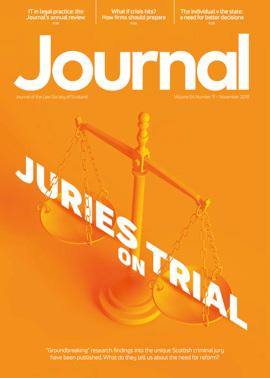Opinon: Gail McKeitch
Autism (including Asperger’s syndrome) affects more than 1% of our population in the UK. At some point in your career you will encounter someone with this complex condition, whether or not diagnosed.
While the vast majority of autistic people are law abiding, some come into contact with the criminal justice system, whether as victims of crime or partners in criminal activity. Actual numbers can be difficult to determine as, although some are recognised as having this complex condition in the early stages of a case, many remain undiagnosed.
Autism, a lifelong, developmental disorder, affects the way an individual perceives the world around them. Some people with autism may also have a learning disability, mental health condition or additional neurological condition (ADHD, OCD, bipolar etc). Supporting people with an autistic spectrum condition can be a challenge for all, especially the justice system. Many people with autism are extremely vulnerable and it’s important they are given the support they need to communicate effectively.
If someone’s behaviour and response presents as different or unusual, consider whether they may have an autistic spectrum disorder. Characteristics vary greatly from one person to another, and an individual can often present as being deliberately difficult, very black and white (literal interpretation) and failing to understand what’s being asked or inferred.
Those with a diagnosis will usually be assessed as having had:
- persistent difficulties with social communication and social interaction;
- restricted, repetitive patterns of behaviours, activities or interests since early childhood, to the extent that these limit and impair everyday functioning.
Many find it difficult to use or understand facial expressions, tone of voice, eye contact and sarcasm, figures of speech or irony.
People with autism can present with good language skills and are often very articulate, but do not understand the expectations of others within a conversation or interview. They may need support if a conversation becomes complicated or is about a topic that makes them anxious. The more anxious an autistic person becomes, the more support they will need and the greater the likelihood for misunderstandings. Many have difficulties processing language and need more time to understand and respond to questions. Many have a very literal understanding of language, and think people always mean exactly what they say. Abstract concepts and vagueness can also be a struggle.
Being arrested, detained, remanded or appearing in court can be an anxiety-provoking experience for most people. People with autism may experience this more intensely, resulting in panic attacks and failing to respond in an acceptable manner. Stress, anxiety, unpredictability and fear of the unknown can cause a client with autism to display behaviour that challenges those around them, verbally (e.g. shouting, screaming, crying), or physically (e.g. kicking, lashing out, biting). An autistic person may respond to your question without understanding the implication, or may agree with you simply because they think they are supposed to. During questioning processes, try to ensure questions are direct, clear and focused on one thing at a time. If possible, provide your questions in writing and allow your client time to read and process the information before responding.
Early identification and assessment of people with autism is vital. The National Autistic Society (NAS) has worked with many police, prison and probation services offering training for staff, introducing autism alerts cards and communication passports. The NAS Autism Accreditation Service also aims to improve autism practice. Training is a key element in helping staff understand the different ways autism can affect an individual and how to support them effectively. Here in Scotland, the Crown Office & Procurator Fiscal Service (COPFS) produced its Criminal Justice Disability Project Report in collaboration with Scottish Government and six criminal justice and disability related organisations. Recommendation 39 describes Police Scotland creating an educational video on autism for all staff, whilst COPFS along with other organisations is developing a policy on how to provide a service to people with autism.
Whilst inroads are being made, we have a long way to go. Improving understanding of autism and training to professionals within the criminal justice system would help identify whether someone may be autistic and benefit from early support and adjustments. Let’s build understanding, provide reassurance and where necessary, side by side support in the dock. This will reduce the anxiety, stress and panic often experienced in holding cells and courtroom procedures, as well as highlighting the need for breaks to the clerk of court or representative. Adapting our approach will help us ensure individuals are understood and potential miscarriages of justice minimised.







